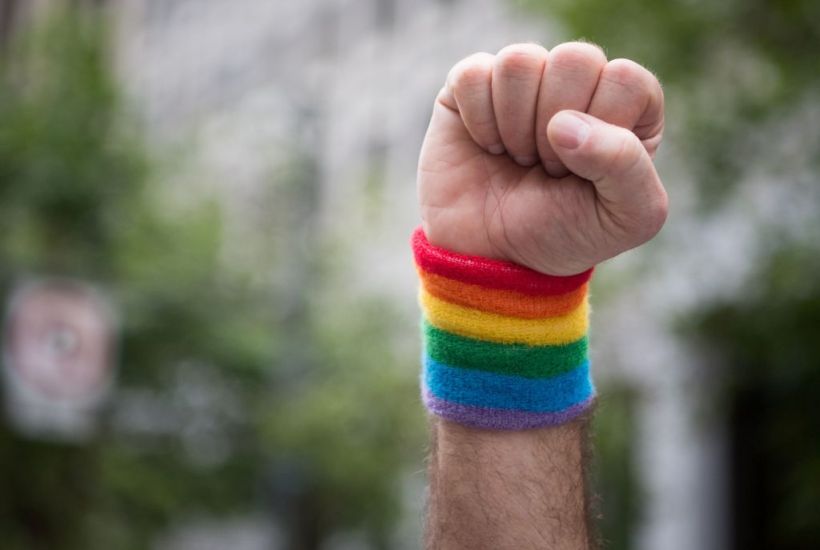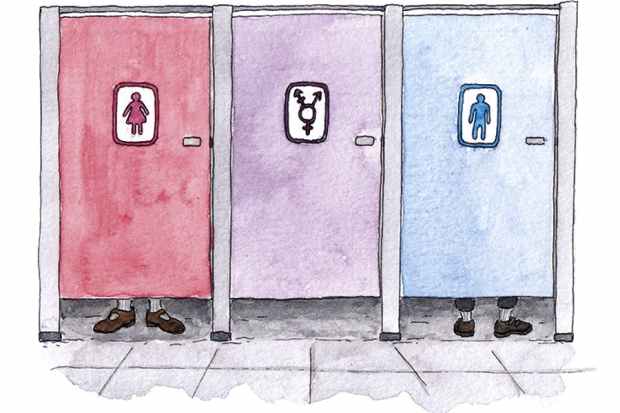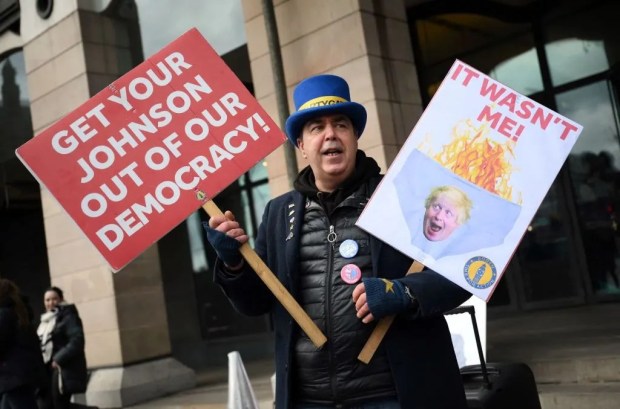Did you know that February is LGBT+ history month? If you have a ‘progressive’ employer you probably do. Banks, universities, local councils, NHS services and train operators are all getting on board. Rainbow flags are flying high above buildings across Britain. But do lesbian, gay, bisexual and trans people really need their own month to reflect on the past? Or is this more an occasion to virtue signal in the present?
To be fair to the Bank of England, when it raised the rainbow flag on Threadneedle Street on 1 February, it was also commemorating Alan Turing. A war hero, who was gay, it is believed Turing took his own life after undergoing chemical castration following his 1952 conviction for ‘gross indecency’. He will be remembered on the new £50 note that is expected to enter circulation by the end of 2021. If we are still using banknotes, that is.
But how much history is involved elsewhere in this month’s festivities? As Britain remains under lockdown, LGBT+ history month has moved online, so geography is no hindrance when attending the various events. As a Lancastrian by birth, I was drawn to a talkby the museum director at Lancaster Castle on 11 February. LGBT+ people were incarcerated and tried at the castle and their legacy remains through the graffiti they left. A week later, the British Academy will ask Why History? The Return of the Closet. These are both worthwhile events.
Elsewhere, however, all too often, history gives way to ideology. The university of Wolverhampton present ‘Pronouns – 5 Top Tips’; while De Montford university in Leicester discusstrans athletes’ participation in sport. I suspect that few people would seek to bar transgender people from sport; what many others are concerned about are biological males elbowing their way into categories that had hitherto been reserved for females. But I’m not holding my breath for a balanced debate.
The takeover of the LGBT+ movement by the gender identity brigade has been breathtaking. Stonewall UK – established in 1989 in response to Section 28 of the Local Government Act 1988 – no longer appears to understand the meaning of same-sex attraction. It defines homosexualas ‘someone who has a romantic and/or sexual orientation towards someone of the same gender‘. And Stonewall says gender is something ‘often expressed in terms of masculinity and femininity, gender is largely culturally determined and is assumed from the sex assigned at birth.’
Gay people, as with trans people, enjoy protection under the law that would have seemed impossible to imagine only a generation ago. Perhaps then they no longer need Stonewall to look out for them?
History has a habit of repeating itself, however, and we would be wise not to forget it. Simon Fanshawe – one of the original Stonewall co-founders recently remarked:
‘The way Stonewall is now being led breaks my heart (as one of the co-founders). Instead of propagating this kind of wibbly wobbly wokeness why are they not getting feet on the ground outside schools where lesbians and gays are again being vilified??’
This is the debate you won’t hear at this year’s LGBT+ history month. But if gay people are being shut out, a trans minority is becoming increasingly vocal in co-opting occasions like this.
The legendary Stonewall riot in 1969 New York – from which Stonewall UK took its name – is now described as being started by trans women. Transgender activist Munroe Bergdorf told the Independent that, ‘when I found out that it was Marsh P Johnson and Sylvia Rivera, two transgender women of colour, who kicked off the Stonewall riots which lead to the gay rights movement it filled me with pride.’
Is that right? Fred Sargeant, a veteran gay rights activist who was there in New York in 1969, had a different perspective. He was dismissive of modern folklore surrounding Johnson and Rivera. ‘I saw him (Johnson) about an hour after the riot started,’ Sargeant told me. ‘The notion that ‘transwomen of colour’ began and led the riots is a baseless, 21st century fiction.’
So who did start things off at Stonewall? As so often, it is a woman whose role is underplayed. Author Julia D Robertson wrote:
‘That night, a brave woman of colour, Stormé DeLarverie was hit on the head with a billy club and handcuffed’.
Sargeant also told me that:
‘DeLarverie was among the first prisoners to be brought handcuffed and struggling out of the bar to be loaded into a paddy wagon. I was about five or six feet from her when she cried out to the group of us on the sidewalk, ‘Why don’t you guys do something?’ That’s when the riot began.’
If we are going to remember LGBT+ history then – and we should – let’s do it properly. There is more to life than flags and pronouns, despite what corporations might think as they sign up to Stonewall UK’s ‘wibbly wobbly wokeness’. There is history to be defended from revisionism – or even denialism – that is eating away at LGBT+ culture.
<//>
Got something to add? Join the discussion and comment below.
Get 10 issues for just $10
Subscribe to The Spectator Australia today for the next 10 magazine issues, plus full online access, for just $10.




















Comments
Don't miss out
Join the conversation with other Spectator Australia readers. Subscribe to leave a comment.
SUBSCRIBEAlready a subscriber? Log in